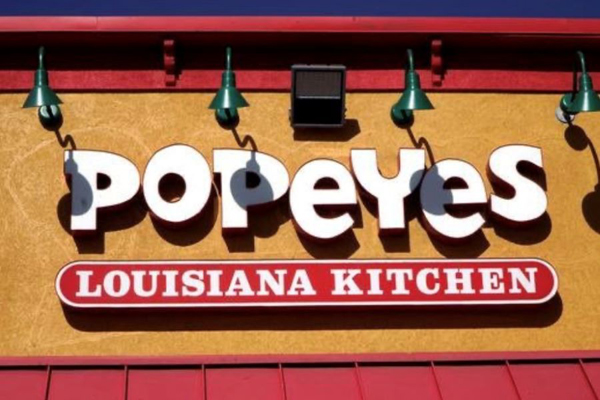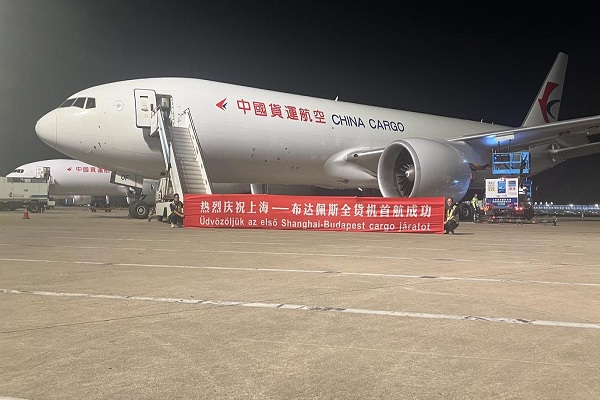Popeyes outlet to open in Shanghai next week

A Popeyes sign is pictured at a Popeyes restaurant in Westminster, Colorado, the U.S. on Feb 22, 2017. [Photo/Agencies]
US-based fried chicken and snacks chain Popeyes Louisiana Kitchen plans to set up 1,500 restaurants on the Chinese mainland in the next 10 years, with the first of these set to open on Huaihai Road, Shanghai, next week, according to company officials.
Raphael Coelho, CEO of Popeyes China, said the Chinese consumer market continues to be a strong attraction for international brands and the Shanghai store is testimony to the demand. The 470-square-meter flagship store incorporates both Chinese and Louisiana design aesthetics and aims to create a premium, unique dining experience for Chinese gourmets.
"Popeyes China plans to open more than 1,500 restaurants in China over the next decade, and the strategy is based on our long-term observation of the China market," Coelho said."We hope to set our roots in the China market and grow in the long run and be loved by consumers and clients," he said.
According to Coelho, after the debut of the brand, Popeyes will continue to expand in the surrounding regions, with plans for new restaurants in Nanjing, Hangzhou, and Suzhou before further expanding to other cities like Beijing, Tianjin, Chengdu, Ningbo, and Wuxi.
Popeyes belongs to the parent company of Burger King, or Restaurant Brands International Inc, one of the biggest quick service catering companies in the world.
The Popeyes Chinese franchise is owned by TFI, or TAB Foods Investments, which is also a major shareholder in Burger King China. TFI is a leading quick-service food operator in Turkey and China, with more than 2,500 restaurants. It debuted in the Chinese market in 2012 with an investment in Burger King, which has expanded to more than 1,300 units in the country in the last seven years.
The success of Burger King in China proved TFI's thorough understanding of the China market. The positive judgment toward China is based on long-term analysis. "We are very positive on our business," said Coelho.
Popeyes' entry into the China market comes at a time when other international retailers like Walmart and Starbucks are planning big investments in China.
Japanese convenience store giant Lawson has decided to invest another 200 million yuan ($28.26 million) in China this year to support the brand's expansion plan, according to Zhang Sheng, vice-president of Lawson (China) Holdings Inc and general manager of Shanghai Lawson Inc. He expressed confidence that Lawson will have 3,000 stores across China by the end of this year.
Coelho said China's speedy recovery from the COVID-19 epidemic gives retailers like Popeyes the confidence to stick with their long-term strategy in the country.
Qi Xiaozhai, head of the Shanghai Society of Commercial Economy, said: "Despite the COVID-19 impact on various businesses, consumption plays a significant role in China's economy."
China's retail sales of consumer products rose by 8 percent to 41 trillion yuan last year. Due to the impact of the novel coronavirus epidemic, total retail revenue of social consumer products slipped to 7.86 trillion yuan in the first quarter, down 19 percent year-on-year, according to National Bureau of Statistics data.
The decline in retail activities is temporary as life and businesses are gradually getting back to normal, said Zhong Ruiyi, senior director of retail services for East China at Colliers International.
"Based on NBS data on the disposable income per capita, nationwide consumption has grown steadily on a yearly basis. Along with Chinese people's ever-updating consumption requirements and the ever-improving business environment, the Chinese consumer market offers huge opportunities for international retailers," said Qi.
The outlook for China's consumption demand is bright, said Fu Linghui, spokesperson of the NBS.According to Fu, the about 4 million middle-income earners form the world's largest middle-income group with gigantic market prospects. In the meantime, the growing consumption capability of the Chinese people, the stable employment, as well as the expanding social security network ensure the steady consumption confidence and outlook of the nation.
In the past few decades, quite a few international consumer brands have established their business and developed a great client base in China. Their collective secret of success is to cater to the special needs of Chinese consumers while making constant innovations, said Qi.

